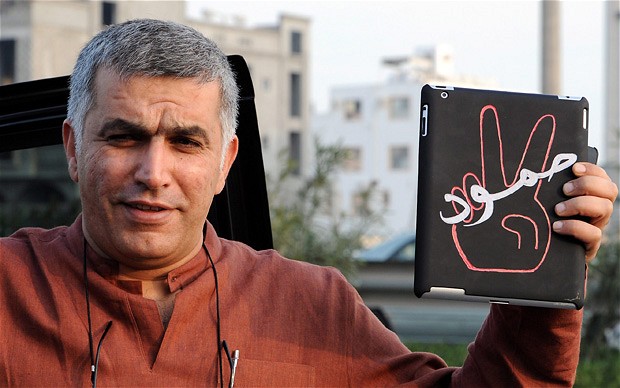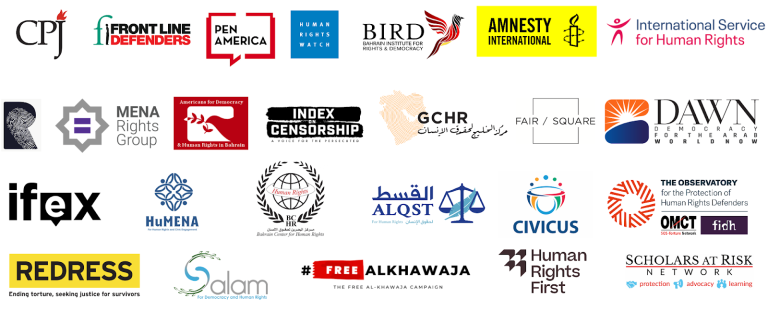17 September 2019 – Bahrain’s High Appeals Court refused to grant a non-custodial sentence to the country’s most prominent human rights defender, Nabeel Rajab, who is currently serving a five-year prison term for his critical comments on social media, the Bahrain Institute for Rights and Democracy (BIRD) said. Rajab’s lawyer confirmed the decision on Twitter.
BIRD condemns today’s decision in the strongest term and urges Bahrain to release Rajab immediately and unconditionally.
Bahrain has recently introduced Law No.18 of 2017 concerning alternative sentencing, allowing for individuals to be released from prison and serve the remainder of their sentence in the form of community service, house arrest, or the payment of fines. Despite applying for alternative sentencing, Rajab has been rejected multiple times without justification.
Rajab was originally sentenced to five years in prison on 21 February 2018 for tweeting his condemnation of airstrikes in Yemen mounted by the Saudi-led coalition and exposing the widespread torture occuring in Bahrain’s notorious Jau Prison. Bahrain’s Court of Cassation upheld his sentence on 31 December 2018.
The UK government received delegations from Bahrain’s Ministry of Interior and Ministry of Justice in August 2018 and March 2019 as part of its technical assistance programme to Bahrain, to discuss the scope and implementation of the law, BIRD learned through a Freedom of Information request. These visits incurred a total cost of £14,319 of taxpayers’ money. Nonetheless, multiple eligible political prisoners applying for alternative sentencing, such as Rajab, have been rejected without justification.
The UK government said that the Embassy in Manama has “regularly attended” Rajab’s court hearings and “closely monitored” his trials, but that they were “not aware of Mr Rajab’s application, and subsequent rejection, for alternative sentencing.” The UK has never called for his release.
Rajab has exhausted all legal remedies and remains in prison, in what the UN Working Group on Arbitrary Detention described as “arbitrary detention.” Since his arrest in June 2016, Rajab was sentenced to seven years imprisonment as a result of two separate trials, both of which violate Rajab’s right to free and peaceful expression.
Yesterday, Donald Trump met with Bahrain’s Crown Prince Salman bin Hamad al-Khalifa, who said that Bahrain has signed an agreement to purchase US Patriot missile battery.
In response to the decision today, Nabeel Rajab’s family said: Rejection after rejection for a man who is in jail for a tweet is a manifestation of the state of injustice our father is subjected to.
Commenting, BIRD’s Director of Advocacy, Sayed Ahmed Alwadaei, said: This is sadly what we have come to expect from Bahrain’s corrupt judicial system. Today’s decision to keep the country’s leading human rights defender behind bars is purely political and the latest shameful attempt to stifle dissent. Trump made clear yesterday that his administration intends to continue selling arms to Bahrain’s dictators while totally disregarding their appalling human rights record.
Background Information
Rajab is the co-founder and President of the Bahrain Centre for Human Rights, as well as a founding director of the Gulf Centre for Human Rights. Due to his advocacy, he has received a number of awards recognising his work, including the Ion Ratiu Democracy Award in 2011 and was a finalist for the Václav Havel Human Rights Prize 2018.
The social media activity held against Rajab occurred entirely in 2015. On 2 April 2015, Rajab was arrested and charged with the following:
- Bahraini Penal Code Article 133: Deliberately announcing “in wartime false or malicious news, statements or rumors…to cause damage to military preparations for defending the State of Bahrain”, which refers to comments on the humanitarian crisis in Yemen.
- Bahraini Penal Code Article 215: “Insulting a neighbouring country”, which refers to his statements against Saudi Arabia.
- Bahraini Penal Code Article 216: “Insulting national institutions”, referring to the Ministry of Interior, based on comments about unrest in Jau Prison in March 2015.
He was released three months later on 13 July 2015 on humanitarian grounds, therefore his charges were never taken to court.
Rajab was again arrested on 13 June 2016 for an unrelated charge, for which he was eventually sentenced to two years in prison in July 2017 for speaking to journalists.
While in detention, Rajab’s trial for his social media activity commenced with its first hearing on 12 July 2016. The trial was postponed 20 times, with a decision being made in the 21st court hearing on 21 February 2018.
BIRD has obtained Rajab’s Public Prosecution documentation, which represents a dossier of all the incriminating tweets for which Rajab is being held accountable.
Rajab’s exposure of the widespread torture inflicted upon inmates in Bahraini prisons occasionally involved criticism of Bahraini oversight institutions, including the National Institute for Human Rights and the Ministry of Interior Ombudsman, both recipients of training funded by the UK. The Public Prosecution documentation further revealed that Rajab’s conviction to five years was also based on re-tweets of critical comments made by others, including the scathing reporting of torture in Jau Prison by Human Rights Watch .
Tweets on the humanitarian crisis in Yemen were also considered offensive including: “We have the right to say no to the war in #Yemen and should struggle for peace and stability but not bloodshed #Sanaa.”





